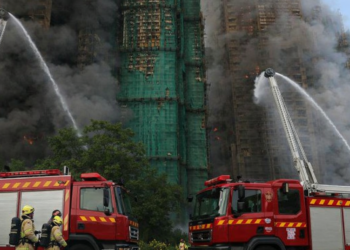London’s Metropolitan Police arrested 41 people on Saturday during a protest in Parliament Square for showing support for Palestine Action, a group recently declared a terrorist organisation by the UK government. The demonstration, which took place outside the British parliament, is the latest in a growing number of protests since the group was outlawed.
Police confirmed the arrests in a statement posted to social media: “Officers have made 41 arrests for showing support for a proscribed organisation. One person has been arrested for common assault.” Just last week, 29 protesters were arrested in a similar London protest. Arrests were also made during demonstrations held in Manchester, while others took place in Cardiff and Northern Ireland.
Protesters say ban on Palestine Action is political
The demonstration in London drew around 50 protesters, many holding placards that read: “I oppose genocide. I support Palestine Action.” They gathered near the statue of Nelson Mandela, a location symbolic for its ties to anti-apartheid activism.
The protesters argue that the UK government’s move to ban Palestine Action is politically motivated. They insist that the group’s methods—mainly acts of civil disobedience—should not be classified under the same laws meant for violent organisations.

Supporters of Palestine Action say its activities have targeted Israeli-linked companies, particularly Elbit Systems, a defence contractor accused by the group of supplying weapons used in Gaza. The group is known for breaking into facilities, spraying red paint, blocking entrances, and damaging equipment.
Government justifies the ban under anti-terrorism law
Palestine Action was officially banned earlier this month under UK anti-terrorism legislation, following a high-profile incident in which members broke into a Royal Air Force base and vandalised planes. According to lawmakers, the group poses a national security risk.
By placing Palestine Action on the list of proscribed organisations, the government has effectively equated it with groups like Hamas, al-Qaeda, and ISIS. Under this classification, even expressing support for the group can carry a penalty of up to 14 years in prison.
Legal appeal fails, concerns grow over civil liberties
The move has drawn sharp responses from civil liberty groups and legal experts who question the application of terrorism laws to acts of protest. In a recent court appeal, a lawyer for Palestine Action argued that this is the first time the UK has used anti-terrorism powers to ban a group whose primary method is direct action and civil disobedience, not armed violence.
The court rejected the appeal, and the ban remains in place.
Context of ongoing Gaza conflict
The demonstrations come amid international scrutiny of Israel’s military campaign in Gaza, which followed the October 7, 2023, Hamas attack on Israel. The International Court of Justice is currently hearing a case brought by South Africa, accusing Israel of genocide. Israel denies all allegations of war crimes and maintains that it is acting in self-defence.
Britain’s political landscape has seen heightened tensions around the Gaza conflict, with pro-Palestinian activism growing across cities. The government, however, insists its actions are aimed at maintaining public safety and national security.
Arrests raise questions over free speech and protest rights
The 41 arrests in London for showing support for Palestine Action highlight the deepening divide between public activism and government policy. For many, the classification of a civil disobedience group as a terrorist organisation feels excessive, while others argue that law and order must be preserved.
Still, the arrests bring up urgent questions about how far governments can go in curbing political dissent, especially when the subject is as divisive as the Gaza conflict. Whether these arrests will discourage further demonstrations or fuel even more resistance—remains to be seen. But for now, London’s police continue to treat support for Palestine Action as a criminal offence.

















